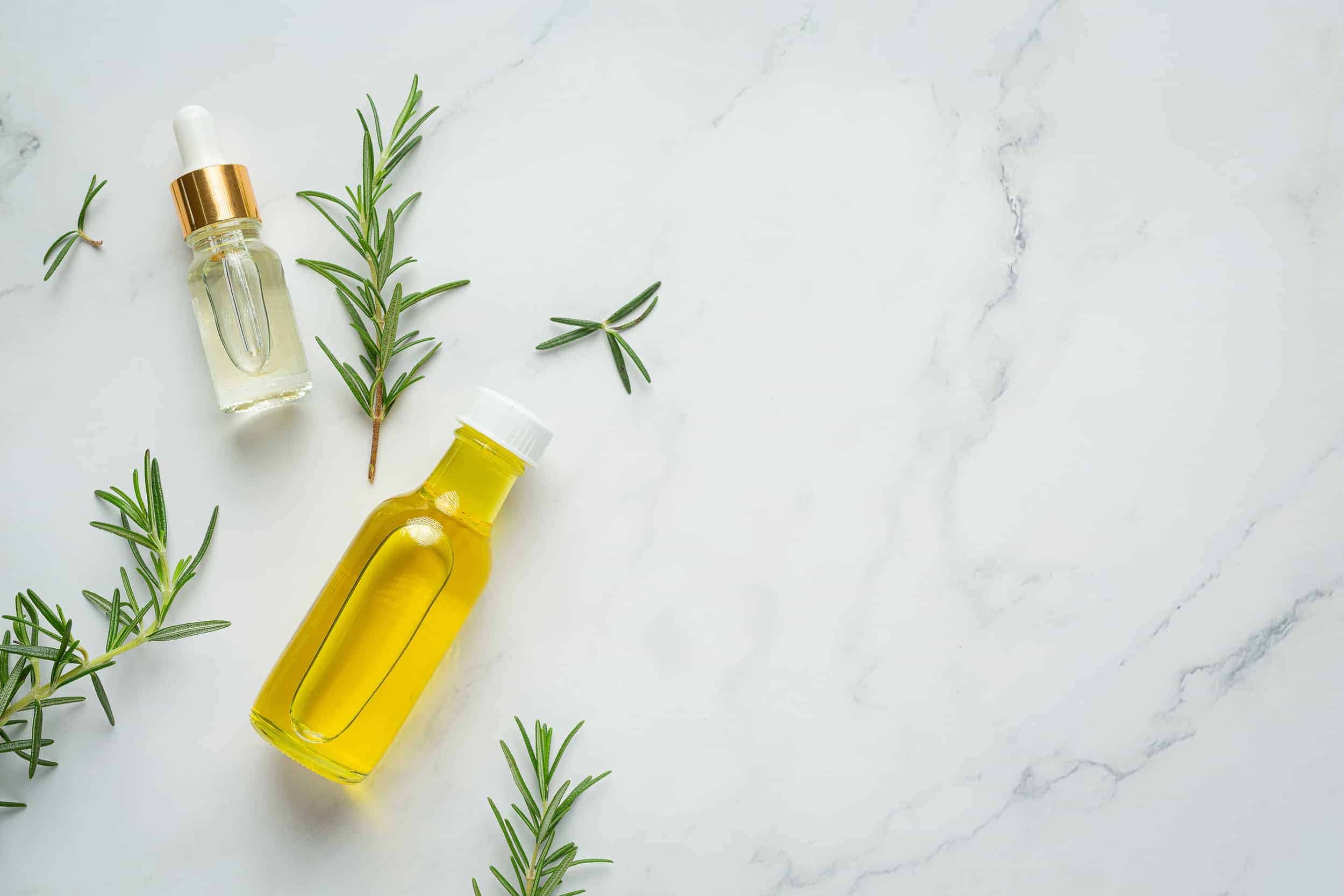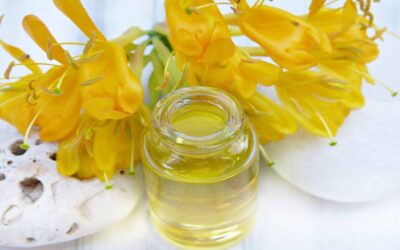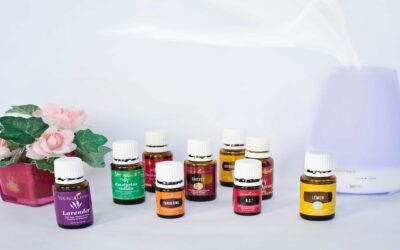Rosemary essential oil is a plant extract and it is most commonly known for its soothing effect on the human brain and is considered as a major part of aromatherapy. It can also be used in the treatment of various diseases and has culinary uses as well. In this article we will explore the possible benefits and known facts of rosemary oil backed by scientific research.
WHAT IS ROSEMARY OIL?
There are more than 400 essential oils available worldwide. Among them, one of the most commonly used oils is rosemary oil which is obtained from the extracts of a blue flower named Rosmarinus officinalis L. It belongs to the mint family and lives around 2 years. It is a perennial herb.
HOW TO MAKE ROSEMARY ESSENTAIL OIL?
In order to make rosemary essential oil at home, we should first make a rosemary concentrate by using dried rosemary leaves and adding them into boiled distilled water. It can be used after waiting for 5 hours so that it may produce highly concentrated oil.
Using rosemary essential oil for hair loss is very easy as you could simply use it with a shampoo available at home by adding around 12 drops to shampoo for a daily hair wash.
However, there is another method of using it, adding rosemary oil in carrier oil by mixing two drops of rosemary oil in a carrier oil and then applying it on the scalp before sleeping. Although such methods are not established by the USFDA, patience and persistence could lead to much better results.
Rosmarinus officinal is usually grown in warm and sunny areas mostly in Asian countries. Its leaves extract can also be used in seasoning especially in Italian and Mediterranean recipes. It may also be added as a flavoring agent in soups and meat.
WHAT IS ROSEMARY OIL GOOD FOR?
Rosemary oil has various uses in our daily life. Below are some potential benefits of rosemary oil backed by scientific studies.
Anti-Inflammatory and Antioxidant Property
Rosemary oil is a powerful booster of the immune system and generally helps in improving blood circulation. Various laboratory studies have shown that rosemary oil contains a good amount of antioxidative compounds which act in neutralizing harmful free radicals.
According to asystematic review on phytochemistry and biological activity of Rosmarinus officinalis L, this oil can heal injured body tissues, helps in reducing inflammation, swelling, joint stiffness and pain.
A study on the effects of rosemary oil on animal models in which rats were used as experimental subjects showed that rosemary essential oil can significantly decrease the amount of free radicals causing inflammation.
Another randomized controlled trial of aromatic therapy patients suffering from rheumatoid arthritis showed that if 15 minutes of knee massages are given to patients with rosemary oil three times a week, there will be more than 50% reduction in knee inflammation within a period of two weeks as compared to other essential oils.
Improves Blood Circulation
We often feel pain and numbness on our extremities. This is due to the lack of sufficient blood circulation especially through the peripheries. According to one study about the topical effects of rosemary oil on women with Raynaud’s diseases, it was concluded that it had a heating effect.
Another study conducted on animal models also confirmed that the expansion of blood vessels occurs in the treatment with rosemary oil.
Stress Management
Rosemary essential oil plays a vital role in stress management. Simply by just inhaling rosemary oil fragrance we can reduce the stress. That is the reason why the use of such oil is very common in ancient medicine treatments.
One research study done on the effects of rosemary essential oil on nursing students, the application of rosemary essential oil sachets before taking a test helped in reduction of stress among students.
Cortisol hormone levels play a key role in determining the health balance of our body. Reduced levels of this hormone could potentially cause various health issues such as depression and lack of sleep. According to one study done on twenty-two students smelling rosemary essential oil reduced the level of cortisol by 23%.
Insecticidal Property
A study done on the efficacy of rosemary oil on greenhouse tomatoes for protection against spider mite when rosemary-based pesticide was used, there was a more than 52% reduction of spider bites among the tomato plants in the greenhouse.
Another important comparative study of rosemary essential oil with eleven other oils proved that the repellent property of rosemary oil was the longest compared to any other essential oil. It also helped in repelling the deadly zika virus carrier mosquitoes named aedes aegypti by more than 90 minutes.
In addition to the above research study, another study which took place in the northeastern United States measured the effect of spray containing around 10% of rosemary essential oil to control the excessive spread of Lyme disease by spreading ticks. The results showed that rosemary essential oil-based spray was equally effective as a chemical based insecticidal spray.
Fosters Cognitive Function
Rosemary has been considered a powerful memory booster from ancient times. An ingredient found in rosemary known as carnosic acid can help battling harmful free radicals. A study done on rats found that rosemary essential oil could safeguard against brain damage especially among people who have a history of strokes.
Recent studies on the role of rosemary essential oil on cognitive functions also indicated that it protects acetylcholine breakdowns which is an important chemical agent considered to be crucial for memory, thinking and concentration.
Another important research study about Alzheimer’s diseases revealed that by just smelling the aroma of rosemary essential oil, dementia can be treated as it is considered as a memory booster. Such aromatherapy is considered as a potential non-pharmacological alternative treatment for those central nervous system disorders.
Vital Role In Hair Growth
A study done in 2013 to measure the effect of Rosmarinus officinalis leaf extract on hair growth revealed that in comparison to people who opt for regular hair loss remedy which is is available on the market by the name of minoxidil (Rogaine) spray, the thickness of hair can be increased in men suffering from androgenetic alopecia massage by the diluted form of rosemary oil at least twice a day for period of six month.
Meanwhile another scientific research on comparison of rosemary oil with neutrals oils such as grapeseed and jojoba oil proved that if the diluted version of rosemary oil is rubbed vigorously into the scalp of people suffering from alopecia areata everyday for period of seven months, the results could well prove to be profound as they found 44% individuals showed improvement in their hair loss.
SIDE EFFECTS OF ROSEMARY OIL
SIDE USAGE TIPS
There are a few safety precautions that need to be established before using rosemary essential oil. It is always better to get advice from your treating doctor. It should not be used in lactating and pregnant females until or unless advisedby a treating doctor.
People with allergic disorders should also be cautious before applying it to sensitive areas of the body such as the mouth and eyes.
It should be kept away from the reach of children as drinking such oil could be injurious to health. So far, there is no scientific evidence of rosemary essential oil in treatments of child scalp conditions.
KEY TAKEAWAYS
Rosemary essential oil has several benefits and the above discussion proves that it is necessary to keep this aromatic oil in our home. Its aroma contributes positively to the home environment and could help keep the individuals mentally relaxed. It benefits memory and hair loss with little side effects. However, it is recommended to never use rosemary essential oil if you are suffering from any previous disease, always consult with a treating doctor in such cases.
Article Sources
HealthxTips is committed to delivering content that adheres to highest standard for accuracy, sourcing and objective analysis.
HealthxTips uses only high-quality and trustworthy sources to support the facts in our articles.
1. Andrade, Joana M & Faustino, Célia & Garcia, Catarina & Ladeiras, Diogo & Reis, Catarina & Rijo, Patrícia. (2018). Rosmarinus officinalis L.: an update review of its phytochemistry and biological activity. Future Science OA. 4. FSO283. 10.4155/fsoa-2017-0124.
2. Atsumi, T., & Tonosaki, K. (2007). Smelling lavender and rosemary increases free radical scavenging activity and decreases cortisol level in saliva. Psychiatry research, 150(1), 89–96. https://doi.org/10.1016/j.psychres.2005.12.012
3. Gillij, Y. G., Gleiser, R. M., & Zygadlo, J. A. (2008). Mosquito repellent activity of essential oils of aromatic plants growing in Argentina. Bioresource technology, 99(7), 2507–2515. https://doi.org/10.1016/j.biortech.2007.04.066
4. Gok Metin, Z., & Ozdemir, L. (2016). The Effects of Aromatherapy Massage and Reflexology on Pain and Fatigue in Patients with Rheumatoid Arthritis: A Randomized Controlled Trial. Pain management nursing : official journal of the American Society of Pain Management Nurses, 17(2), 140–149. https://doi.org/10.1016/j.pmn.2016.01.004
5. Hay, I. C., Jamieson, M., & Ormerod, A. D. (1998). Randomized trial of aromatherapy. Successful treatment for alopecia areata. Archives of dermatology, 134(11), 1349–1352. https://doi.org/10.1001/archderm.134.11.1349
6. Jimbo, D., Kimura, Y., Taniguchi, M., Inoue, M., & Urakami, K. (2009). Effect of aromatherapy on patients with Alzheimer’s disease. Psychogeriatrics : the official journal of the Japanese Psychogeriatric Society, 9(4), 173–179. https://doi.org/10.1111/j.1479-8301.2009.00299.x
7. Juergens U. R. (2014). Anti-inflammatory properties of the monoterpene 1.8-cineole: current evidence for co-medication in inflammatory airway diseases. Drug research, 64(12), 638–646. https://doi.org/10.1055/s-0034-1372609
8. McCaffrey, R., Thomas, D. J., & Kinzelman, A. O. (2009). The effects of lavender and rosemary essential oils on test-taking anxiety among graduate nursing students. Holistic nursing practice, 23(2), 88–93. https://doi.org/10.1097/HNP.0b013e3181a110aa
9. Miresmailli, S., & Isman, M. B. (2006). Efficacy and persistence of rosemary oil as an acaricide against twospotted spider mite (Acari: Tetranychidae) on greenhouse tomato. Journal of economic entomology, 99(6), 2015–2023. https://doi.org/10.1603/0022-0493-99.6.2015
10. Moss, M., & Oliver, L. (2012). Plasma 1,8-cineole correlates with cognitive performance following exposure to rosemary essential oil aroma. Therapeutic advances in psychopharmacology, 2(3), 103–113. https://doi.org/10.1177/2045125312436573
11. Murata, K., Noguchi, K., Kondo, M., Onishi, M., Watanabe, N., Okamura, K., & Matsuda, H. (2013). Promotion of hair growth by Rosmarinus officinalis leaf extract. Phytotherapy research : PTR, 27(2), 212–217. https://doi.org/10.1002/ptr.4712
12. Rand, P. W., Lacombe, E. H., Elias, S. P., Lubelczyk, C. B., St Amand, T., & Smith, R. P., Jr (2010). Trial of a minimal-risk botanical compound to control the vector tick of Lyme disease. Journal of medical entomology, 47(4), 695–698. https://doi.org/10.1603/me09283
13. Sayorwan, W., Ruangrungsi, N., Piriyapunyporn, T., Hongratanaworakit, T., Kotchabhakdi, N., & Siripornpanich, V. (2013). Effects of inhaled rosemary oil on subjective feelings and activities of the nervous system. Scientia pharmaceutica, 81(2), 531–542. https://doi.org/10.3797/scipharm.1209-05
14. Seyedemadi, P., Rahnema, M., Bigdeli, M. R., Oryan, S., & Rafati, H. (2016). The Neuroprotective Effect of Rosemary (Rosmarinus officinalis L.) Hydro-alcoholic Extract on Cerebral Ischemic Tolerance in Experimental Stroke. Iranian journal of pharmaceutical research : IJPR, 15(4), 875–883.
15. Takaki, I., Bersani-Amado, L. E., Vendruscolo, A., Sartoretto, S. M., Diniz, S. P., Bersani-Amado, C. A., & Cuman, R. K. (2008). Anti-inflammatory and antinociceptive effects of Rosmarinus officinalis L. essential oil in experimental animal models. Journal of medicinal food, 11(4), 741–746. https://doi.org/10.1089/jmf.2007.0524
16. von Schoen-Angerer, T., Deckers, B., Henes, J., Helmert, E., & Vagedes, J. (2018). Effect of topical rosemary essential oil on Raynaud phenomenon in systemic sclerosis. Complementary therapies in medicine, 40, 191–194. https://doi.org/10.1016/j.ctim.2017.10.012








0 Comments